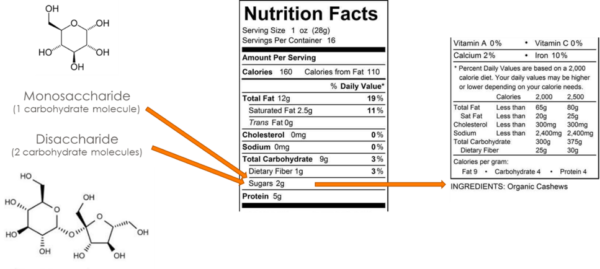 “I try to not eat as much sugar, but it’s so hard in our American diet to do that… It’s hard to completely avoid.”
“I try to not eat as much sugar, but it’s so hard in our American diet to do that… It’s hard to completely avoid.”
(Tom Brady)
Matt and Kyle have written here and here about the need to reduce sugar intake in order to reach optimal health. Heck, even I’ve written about the fact that artificial sweeteners should never be consumed! Beyond those chemicals, “natural” sweeteners are best avoided, and real sweeteners need to be consumed on a limited basis to keep blood sugar levels under control, inflammation at bay and healthy microbiota prospering. While I stand by this, I recently discovered that the “War on Sugar” message can be very confusing as it’s impossible and completely unnecessary to give up all sugar.
Before you decide that I’ve lost my marbles and my certifications should be revoked, let me explain why you don’t need to give up all sugar.
Recently, I hosted one of my online group programs. During our time together, I ask participants to give up, among other things, all sweeteners for four weeks. When reminding participants about what we were keeping out of our diets each week, I would sometimes say “sweetener” and sometimes I would say “sugar.” Knowing this is difficult for many people, I would also give them suggestions about what to eat when they would normally have a sweet treat.
One of my favorite snacks is raw cashews. I find them to be slightly sweet, so they can help when someone has a sweet craving, while also being a good source of healthy protein, fat, fiber, vitamins and minerals. A few days after making this recommendation and seeing the enthusiastic responses from other participants, a very intelligent and successful participant asked on our group Facebook page, “How are all of you eating cashews? I can’t find any that don’t have at least two grams of sugar in them!”
Oops! I had failed to clearly communicate about sugar and give people the guidance they need to implement my suggestion of removing all sweeteners! So, here is what I really want my clients, and YOU, to know about eating sugar:
Naturally occurring sugars are components of carbohydrate containing foods, including vegetables and fruits. When consuming a healthy diet, you will continue to consume sugar in these natural forms, while also limiting or eliminating your intake of added sugars.
Still unclear? Let me break it down a bit more by telling you all the things we mean when we say “sugar.”
The word sugar is sometimes used to mean any kind of sweetener. Obviously, this is the generic use of the word and not very helpful as it doesn’t take into account the nuances of sweeteners, since each type has a different impact. However, the more specific uses of “sugar” are also not very helpful.
Sugar (or more accurately “table sugar” or “granulated sugar”) is the everyday word for sucrose, a two molecule carbohydrate (or disaccharide) made of glucose and fructose. This is arguably the most accurate use for the word “sugar”, but unfortunately isn’t the one we are exposed to most often. The one we see most often is reserved for the word on the Nutrition Facts Label.
On boxed, bagged, canned and bottled foods and beverages, the Nutrition Facts Label’s “Sugars” refers to all the monosaccharides and disaccharides in the food. This means when you see some quantity of “Sugars” on a food label, it is referring to all of the one and two molecule carbohydrates in the food, regardless of whether they naturally exist or whether they were added during processing.
Let’s go back to the example of cashews. If you look at the Nutrition Facts Label for raw cashews, you will see they contain some amount of sugar. In the example below, this particular brand of cashew has 2 grams of sugar for every ounce of nuts. In other words, if you could completely dissect these nuts into their various nutrients, you would have 2 grams of mono- and/or disaccharides in the 28 grams of nuts, along with 12 grams of fat, 7 grams of non-sugar carbohydrates, 5 grams of protein, and 2 grams of other nutrients. Of course, by looking at the Ingredients List (which shows only organic cashews), you can tell that these are naturally occurring sugars and not an added sweetener. But, if you are simply trying to eliminate “sugar”, this is confusing because it looks like you can’t eat cashews.
[Tweet “When consuming a healthy diet, you will continue to consume sugar in these natural forms”]

Unfortunately, food manufacturers have until July 2018 to comply with the FDA’s new food label regulations that will differentiate “Added Sugars” from “Total Sugars”, which will continue to include those that occur naturally in food[1]. This means that you will have to look at both the Nutrition Facts Label and the Ingredients List to understand if the sugar you are consuming is how nature intended the food to be or if the food manufacturer is adding sweeteners, which are detrimental to your health if consumed on a regular basis and/or in large amounts.
Bottom Line:
Added sweeteners (including artificial sweeteners, corn syrup, maple syrup and table sugar) should be consumed in very limited quantities. But naturally occurring sugars are a necessary part of a healthy diet because they are components of whole foods like vegetables, fruits, legumes, nuts and seeds.
Sources:
[1] U.S. Food & Drug Administration.
Image via Unsplash | This post may contain affiliate links, which means if you click and then purchase we will receive a small commission (at no additional cost to you). Thank you for reading & supporting Happy Living!

